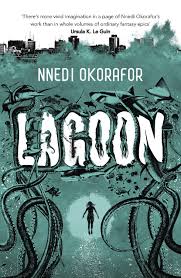 I’ve just finished reading Nnedi Okorafor’s Lagoon, and what a surprising, inventive and above all enriching text it is. It took me a while to get into this novel, but suddenly it all started coming together for me and by the end I felt literally breathless with excitement at what I’d read. This is a story – with its jump cuts, tessellations and chaotic crowd scenes, Okorafor encourages us to view it as a film – about aliens invading the city of Lagos, but such a bald summary seems too straightforward for a book that will feel unlike any other alien invasion story you’ve ever read. Science fiction cohabits with fantasy in the most relaxed, devil-take-it manner, producing a vigorous, gorgeous mutation, a runaway train of speculation that is, well, exactly what the book-doctor ordered. It’s fearless.
I’ve just finished reading Nnedi Okorafor’s Lagoon, and what a surprising, inventive and above all enriching text it is. It took me a while to get into this novel, but suddenly it all started coming together for me and by the end I felt literally breathless with excitement at what I’d read. This is a story – with its jump cuts, tessellations and chaotic crowd scenes, Okorafor encourages us to view it as a film – about aliens invading the city of Lagos, but such a bald summary seems too straightforward for a book that will feel unlike any other alien invasion story you’ve ever read. Science fiction cohabits with fantasy in the most relaxed, devil-take-it manner, producing a vigorous, gorgeous mutation, a runaway train of speculation that is, well, exactly what the book-doctor ordered. It’s fearless.
Predictably, it was the deft post-modernist touches that, for me, lifted the novel beyond the good and towards outstanding. I loved the ‘I was there’ chapters – non-linear snapshots of narrative from random people caught up by events – and those ‘wink’ moments when Okorafor steps out of the text to ask her readers: ‘How would you have felt?’ Of course I’m going to love the Spider the Artist sections, and indeed all the chapters narrated by non-human characters (a swordfish, a bat, a tarantula, a man-eating road) were pure narrative joy. I loved the ‘deleted’ chapter set in Chicago, too – there are so many memorable moments and ideas. Oh, and did I mention the richness of the language, the textures of languages, plural, that permeate this book? I could go on and on.
I am lost in admiration of Okorafor’s creativity, the way she seizes her themes, weaving humour and beauty and stark political commentary seamlessly together. I especially appreciate what Lagoon has to say about instinct and logic, how both are important and indeed essential – to art, to science, to a balanced view of the world, to life.
SFF like this – SFF that obeys no pre-set archetypes and invents its own rules – is such a breath of fresh air. It reminds us of the limitless possibilities of the genre, encourages us to try writing (or indeed reading) something new and inimitably personal to us.
What a wonderful book, and what a perfect start to my reading in 2015. How it surprised me. I love it when this happens.
For the year ahead, there are still some 2014 titles I want to read before I start turning my attention to what’s coming out this year – 2014 seems to have been an exceptional year for SFF novels, I think, which should hopefully make things interesting as awards season rolls around. I’m also intending to shore up some of the gaps in my SFF knowledge in 2015 by making a conscious effort to read more back catalogue SF – I’ve not read A Canticle for Leibowitz, for instance, or Dhalgren, The Female Man, Kindred and that’s just for starters.
And what about 2015 titles I am looking forward to? I’m sure there are loads I don’t know about yet, hopefully with many exciting discoveries among them. But of those I do know about, books I’m especially looking forward to include Kelly Link’s new collection Get in Trouble, China Mieville’s new collection Three Moments of an Explosion, Catherynne Valente’s Art Deco Hollywood-in-space novel Radiance (if it’s anything like as wonderful as ‘The Radiant Car thy Sparrows Drew’ it’s going to be fantastic), Sarah Hall’s The Wolf Border, Anna Small’s The Chimes and Alexis Wright’s The Swan Book (both these last sound really intriguing). Looks like a good year to me!